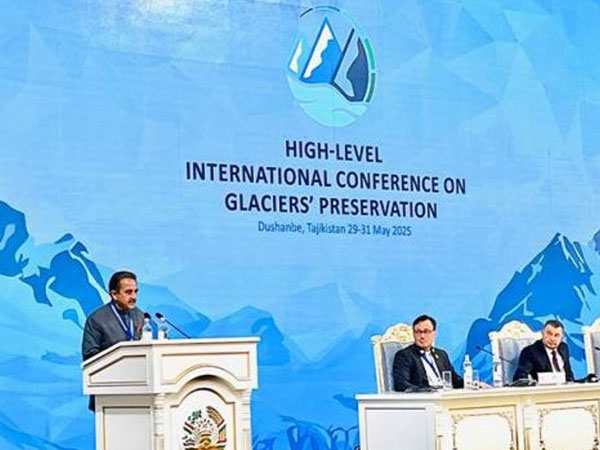Union Minister of State for Environment, Forest and Climate Change (EFCC), addressed the Plenary Session of the High-Level International Conference on Glaciers’ Preservation, held from May 29-31 in Dushanbe, Republic of Tajikistan.
According to the Ministry of Environment, Forest and Climate Change, the event brought together international experts, policymakers, and Ministers to deliberate on urgent actions needed to safeguard glaciers, which serve as critical freshwater reservoirs and indicators of climate change.
In his address, Singh emphasised that the retreat of glaciers represents not only a warning but an immediate reality with far-reaching implications for water security, biodiversity, and the livelihoods of billions of people.
Highlighting the global and regional consequences of glacial retreat, the Minister underscored that the phenomenon is accelerating, with disproportionate impacts on mountain regions such as the Himalayas.
He reiterated India’s deep-rooted concern, as a country intrinsically connected to the Himalayan ecosystem, and outlined a series of ongoing initiatives aimed at glacial monitoring and climate adaptation.
Singh highlighted that India is undertaking strategic actions under the National Mission for Sustaining the Himalayan Ecosystem (NMSHE) – a key component of India’s National Action Plan on Climate Change (NAPCC) – as well as the establishment of a Centre for Cryosphere and Climate Change Studies, designed to advance research and monitoring of glaciers and glacial lakes in the Indian Himalayan Region.
Further, it was stated that India is leveraging advanced Remote Sensing and Geographic Information System (GIS) technologies, led by the Indian Space Research Organisation (ISRO), to systematically monitor changes in glacier mass, extent, and dynamics.
These efforts are further strengthened through coordinated research by key national institutions, including the National Centre for Polar and Ocean Research (NCPOR), National Institute of Hydrology (NIH), Wadia Institute of Himalayan Geology, and the G.B. Pant National Institute of Himalayan Environment (NIHE).
These initiatives are crucial to advancing scientific understanding of glacier systems and supporting data-driven policy formulation for the sustainable management of India’s water resources.
India has strengthened disaster preparedness in the Himalayan region through improved early warning systems and Glacial Lake Outburst Flood (GLOF) risk mapping, coordinated by the National Disaster Management Authority (NDMA).
Regional cooperation was underscored as vital for strengthening resilience, improving data-sharing frameworks, and fostering coordinated responses to the challenges facing mountain ecosystems, Singh informed.
Addressing the global context, the Minister reaffirmed India’s commitment to equity and the principle of Common but Differentiated Responsibilities and Respective Capabilities (CBDR-RC) in international climate action. He emphasized that while South Asia contributes minimally to global cumulative emissions, it remains highly vulnerable to climate change impacts.
Under the leadership of Prime Minister Narendra Modi, India continues to pursue an ambitious and balanced climate strategy.
The country has made significant progress toward its Nationally Determined Contributions (NDCs) under the Paris Agreement, achieving major milestones.
It was emphasised that the need for differentiated and context-specific approaches to climate adaptation and mitigation, recognizing varying national circumstances, development needs, and historical responsibilities, is imperative.
Concluding his address, the Minister welcomed the declaration of 2025 as the International Year of Glaciers’ Preservation and the Decade (2025-2034) of Action for Cryospheric Sciences, and called for enhanced global cooperation, shared scientific research and increased financial and technological support for developing countries. India stands ready to strengthen partnerships, share expertise, and contribute meaningfully to collective efforts to safeguard glaciers and ensure the resilience of our shared future. (ANI)








